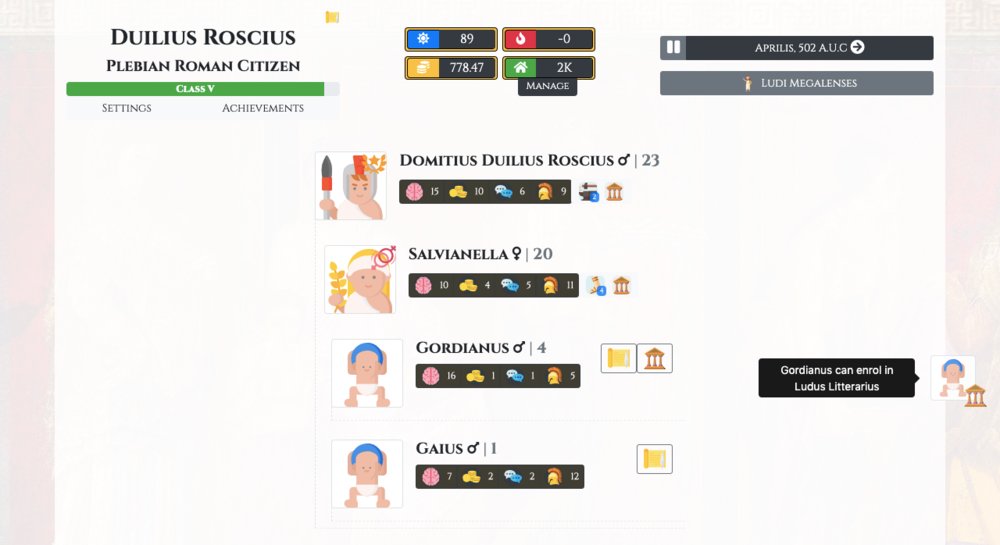The game Citizen of Rome – Dynasty Ascendant allows you to live the life of a common Roman family, while you try to move up the social ladder. We asked the makers of the game some interesting questions!
In this game, you play as the Pater familias, you are the man that takes care of your family; their assets, their marriages, their education and you try to make sure that the next generation will be well looked after. When you die, the title will fall to your eldest son, or your designated heir. The game has a clean and simple look and has received a lot of positive reviews on Steam (Citizen of Rome – Dynasty Ascendant, Sathvik Software Solutions).
However, what makes this game really interesting from a historical perspective, is their use of festivals. Roman society partly revolved around festivals, they were both important socially and religiously, and this is why there are a lot of them (interested? take a look at this calendar). In the game, you need to interact with these festivals if you want to gain bonuses as well as increase your personal and family’s influence and social stance.

This game does a good job at driving home just how important these festivals were, but they also provide you information about each festival, giving it an educational value as well. This is what sparked my interest to find out what the thoughts behind this game were, and the maker of the game was willing to answer the questions I asked.
First of all, I asked what the inspiration was for this game and why they decided to pick the Roman society in particular, since the template of family managing could be applied to other historical societies as well.
Frankly, my fascination for games based on real-life, especially those that can give us a glimpse into lives of people from the past and historical games, with Crusader Kings 2 being one of my all-time favourites – I felt this kind of a daily life sim would be quite interesting, and with Rome being an evergreen favourite (both mine and for a lot of people) with tons of easily available detailed information, it was a natural choice.
Clearly this game is designed for both a specific audience as well as broad one with interest in the Roman empire. The empire still receives a lot of attention which is why the number of new games, movies and books are still growing. The academic field is ever-expanding as well and a lot of sound information can be found online and the makers of Citizens of Rome used this available information to their advantage, mainly JSTOR.

Secondly, I wanted to know why they decided to feature festivals in such a prominent way, since I did not come across the use of them like this in other games before.
The core idea is to put the player in the Roman world, viewing things from the perspective of a common Roman family. Festivals honouring their various Gods were an integral part of their daily lives and so they form a natural recurring set of events for us to use in-game as well.
A lot of games are focussing on action or on politics, but this game does something different. It focusses on a common Roman family which has, in the beginning at least, nothing to do with politics, except for the taxes they need to play. For those people especially the festivals were important to look forward to, not only as chances to honour the gods and improve their social influence, but also to enjoy themselves, since on these days they usually had a day off. It helps us see more regular persons, who are mainly concerned with having enough means to support themselves, staying healthy and caring for their other family members.
Lastly, I asked what the future of this game might look like and what they would like to add.
The game has already come very far from when we initially released it and has changed in fairly significant ways since. We believe in a long-lived continuous improvement/development model where we continue to add stuff and improve the game as long as there is player interest & sales, similar to other indie classics.
The current overarching goal is to allow players to experience some of the key things from life during the mid-late Roman Republican period, and things that interesting Romans did, as a part of a dynamic gameplay experience without railroading history.
To that end, we’re currently working on adding warfare events into the game and the effect war had on things back home. We’re also going to be overhauling the senate, adding a system to pass laws, have potential dictatorships/proscriptions, the system of Roman patronage, provincial governorships and tax farming and much more of the shenanigans the Romans got into during this time period, slowly, piecemeal over time of course, as we’ve done so far.
What is especially interesting to me is the addition of warfare. Of course, the Roman Empire had a big army and regularly needed to fight wars or suppress rebellions. While most games focus on what happens on the battlefield, the effects back home are also of great importance and interest. I hope this will be added to the game since this will allow us to look at another interesting common experience for everyday life. Secondly, I am glad they care for this time period so much they want to add things ‘without railroading history’ and I think we can expect some intriguing things from them.
Drop in on Thursday, October 22nd, 21:30 to see us play the game on https://www.twitch.tv/valuefnd and check out their game at https://rome.rangergo.net/
